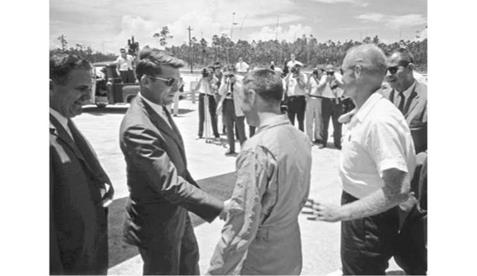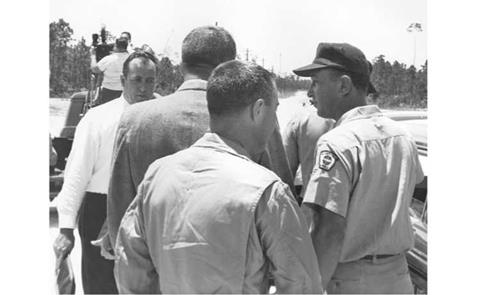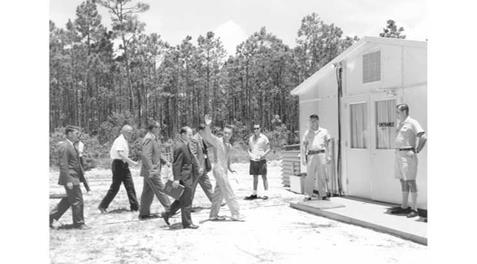GRAND BAHAMA ISLAND
On his arrival at Grand Bahama Island, some 4 hours and 18 minutes after the MR-4 liftoff from Cape Canaveral, Gus Grissom jumped from the S-2F, shaking the hand of and receiving a warm welcome from NASA Administrator James Webb, there to meet him.
“Congratulations on a wonderful job,” Webb remarked. Noting that Grissom had flown as co-pilot on the S-2F, he added with a smile, “I see you’re not tired of flying.”
“Not a bit,” Grissom responded.
|
|
With NASA Administrator James Webb (left) looking on, Grissom is greeted by his fellow astronauts Wally Schirra and John Glenn. (Photo: NASA)
|
|
With all the greetings completed, Grissom is escorted to the base commander’s car for the drive over to the medical facility. (Photo: NASA)
After thanking Webb for being there, Grissom then shook hands and joked for several moments with fellow astronauts John Glenn and Wally Schirra. “You’re looking good,” Schirra told Grissom. The astronaut was then ushered into a waiting car belonging to Capt. Hugh May, the Air Force commander of the missile tracking station, and driven about a mile away to a specially built medical facility. The clinic had been erected amid a collection of barracks and buildings that were surrounded in turn by scrub pines and palmettos.
It was originally planned that Grissom would remain on the island for two days before returning to Cape Canaveral for a full-on press conference. While there he would be virtually isolated from newsmen and photographers, who were not permitted direct contact with him because the doctors, engineers and psychologists wanted to question the astronaut without having any ideas planted into his head by outside influences. In addition to further debriefings on the flight, more extensive medical checks would be conducted by Dr. William Douglas and a team of four specialists.
Soon after Grissom’s arrival it was time for his first physical checkup, some X-rays, and an hour of freely dictating what he recalled of his flight. He interrupted all this at one stage to call his wife Betty in Newport News to let her know he was safe and well. She was relieved to hear from her husband and jokingly told him that she had been told he “got a little bit wet.” On a more serious note she asked if he was okay.
“Sure, I’m fine,” he replied. “The water was warm and you know I like to swim.” In fact, Grissom was a poor swimmer.
Betty also asked with a little trepidation in her voice how the hatch had blown and if he had anything to do with it. He told her “the hatch just blew.” After a little more desultory chat about his flight, he ended the conversation on a lighter note
|
Escorted by Public Affairs Officer Lt. Col. ‘Shorty’ Powers (with folder), Grissom arrives at the medical facility with a wave to news reporters. (Photo: NASA) |
by asking Betty to bring some extra slacks and shirts for him when she met up with him in Florida.7
As the astronauts’ aerospace nurse, Dee O’Hara was there to assist Dr. Douglas in evaluating the health of the astronaut.
“Gus arrived at GBI to start his debriefing along with Jim Lewis, the recovery helicopter pilot (and all around great guy) relatively soon after his scary recovery,” she reflected. “We didn’t have a clue as to what he had just experienced, or at least I didn’t. He was quite fatigued, as one would imagine. As soon as he arrived, Bill Douglas gave him his post-flight physical exam. There was a lot of activity going on and Gus was anxious to get on with the debriefing. He did slip out for a moment to call Betty and say he was okay. The plan was for Gus to stay for 48 hours, but Dr. Douglas decided he was recovered sufficiently to return to the Cape. NASA officials were anxious to get started on the briefing and learn exactly what happened to cause Liberty Bell 7 to sink.”8
That evening, Grissom watched television reports of his flight. He then spent a quiet, relaxing night, briefly attending a celebration held in his honor by the 263 men – mostly civilians – at the island’s auxiliary Air Force base, the first tracking station southeast of Cape Canaveral. He finally retired to his hospital bed around 9:00 p. m.
Meanwhile, news reporters on Grand Bahama Island were eagerly hunting out stories concerning the flight and the capsule mishap to fill their newspaper columns. In order to mollify them a little, a press conference was set up for the next morning with the four Marine helicopter pilots available for questions. Grissom would not be attending.
Once it began, Col. Powers told the gathered crush of reporters that the astronaut looked much less fatigued than the day before. Grissom was in “excellent condition, bright and sharp, and anxious to get home.” Asked if the astronaut had ever been in any real danger following his flight, Powers lightly responded, “You’re in danger if you’re in the middle of the ocean in a pressure suit.”
Responding to another question concerning whether Grissom had expressed any dissatisfaction with his own performance, Powers said, “He feels like he has done a good job. From everything I’ve heard, he indicates he is satisfied with the operation.”
“We learned some new lessons from this flight,” chipped in James Webb. “The evaluation of them has not yet been made.”9
As Marine pilot John Reinhard later told space flight historian Rick Boos, the questions from the press that day about the helicopter activities started to get quite pointed, and it all began to get a little out of hand. This is, until a cheesed-off Wally Schirra stepped in.
“Wally Schirra was always my favorite astronaut,” Reinhard recalled. “I watched him peel the ass off a bunch of reporters on GBI after the flight. They were asking crap ass questions of us after we lost Liberty Bell. You know, we weren’t press conscious or anything; we were just a bunch of dumb Marines and [Schirra] stepped forward, and boy, he started in about them giving us a red ass about something that we so valiantly tried to do, and ordered them to stop asking such stupid questions.
“God, I thought Wally was going to kill a couple of those reporters! I could just hear the cameras and microphones being shut off. I guess this is over, I thought.”10













